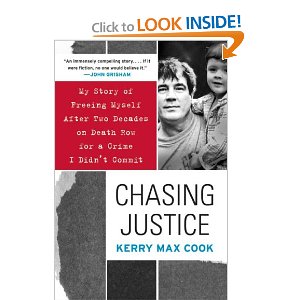 The case of State of Texas v. Kerry Max Cook, the twenty year series of trials and appeals in which the State of Texas through the Smith County District Attorney’s Office (Tyler, TX), continually lied, knowingly presented perjured evidence, and did everything evil that rogue prosecutors are able to do, is a tale of one brave individual who survived it all and lives to tell about it today. Tried in 1978 and convicted on the false testimony of a jailhouse snitch, whose motive for testifying – a 2 year sentence in his own murder case – was withheld from the defense, who was personally coached by the prosecution into testifying to a detailed false confession, together with a false opinion of a state “expert” who claimed to be able to judge the age of fingerprints on a door, and the hiding of evidence by the prosecution of exculpatory evidence including evidence that Kerry Cook had been invited to the victim’s apartment three days earlier (which explained his fingerprints), were all part of an evil recipe to convict and kill a young boy for the sake of prosecution politics and statistics. Justice be damned.
The case of State of Texas v. Kerry Max Cook, the twenty year series of trials and appeals in which the State of Texas through the Smith County District Attorney’s Office (Tyler, TX), continually lied, knowingly presented perjured evidence, and did everything evil that rogue prosecutors are able to do, is a tale of one brave individual who survived it all and lives to tell about it today. Tried in 1978 and convicted on the false testimony of a jailhouse snitch, whose motive for testifying – a 2 year sentence in his own murder case – was withheld from the defense, who was personally coached by the prosecution into testifying to a detailed false confession, together with a false opinion of a state “expert” who claimed to be able to judge the age of fingerprints on a door, and the hiding of evidence by the prosecution of exculpatory evidence including evidence that Kerry Cook had been invited to the victim’s apartment three days earlier (which explained his fingerprints), were all part of an evil recipe to convict and kill a young boy for the sake of prosecution politics and statistics. Justice be damned.
I wish I could tell you the entire story, but instead I encourage you to read the story of Mr. Cook as only he can tell it, in his book Chasing Justice. It details the investigation and defense of his case, and the sordid details of life on death row as a young boy from East Texas. Mr. Cook vividly details being sexually assaulted in prison and life in Texas prisons in the late 70s and 80s. His appeal sat on the dockets of the Texas Court of Criminal Appeals (where death penalty appeals are directly sent to speed up the killing process), for eight years. Yes, eight years went by before his first appeal could be heard and he could proceed to the United States Supreme Court. Although the Dallas Morning News and other investigative journalists tracked down the “jailhouse snitch,” who admitted that his testimony was a total fabrication.
 Sherman & Plano, TX Criminal Defense Lawyer Blog
Sherman & Plano, TX Criminal Defense Lawyer Blog



 The convict-at-all-costs mentality that surrounds these cases is why many defense lawyers will tell you that aggravated sexual assault of a child trials have become the Salem Witch trials of modern times. One on trial in Texas for aggravated sexual assault of a child might as well be on trial in 17th century Salem, Massachusetts for the charge of consorting with Satan. One’s friends, neighbors and even family often come in and bear false witness against the accused for whatever motive or because they believe the child, and when the accused speaks in his defense, well we would expect someone consorting with Satan to deny that they were consorting with Satan.
The convict-at-all-costs mentality that surrounds these cases is why many defense lawyers will tell you that aggravated sexual assault of a child trials have become the Salem Witch trials of modern times. One on trial in Texas for aggravated sexual assault of a child might as well be on trial in 17th century Salem, Massachusetts for the charge of consorting with Satan. One’s friends, neighbors and even family often come in and bear false witness against the accused for whatever motive or because they believe the child, and when the accused speaks in his defense, well we would expect someone consorting with Satan to deny that they were consorting with Satan. Last session, the Texas Legislature enacted Texas’s version “Jessica’s Law,” which increased the penalties for the crimes of aggravated sexual assault of a child under 6 and continuous sexual assault of a child. While most of us agree that a legitimate charge of such an offense should warrant a harsh punishment, those falsely accused of aggravated sexual assault of a child or continuous sexual assault of a child are painted into an even harder corner simply by being indicted. While these cases can be difficult to prosecute for various reasons, the legislation raises the issue once again of should we create such a stacked deck of state witnesses/false or highly questionable expertise, combined with draconian punishment schemes, whereby we dramatically increase the chance of false convictions to keep more of the guilty from getting away.
Last session, the Texas Legislature enacted Texas’s version “Jessica’s Law,” which increased the penalties for the crimes of aggravated sexual assault of a child under 6 and continuous sexual assault of a child. While most of us agree that a legitimate charge of such an offense should warrant a harsh punishment, those falsely accused of aggravated sexual assault of a child or continuous sexual assault of a child are painted into an even harder corner simply by being indicted. While these cases can be difficult to prosecute for various reasons, the legislation raises the issue once again of should we create such a stacked deck of state witnesses/false or highly questionable expertise, combined with draconian punishment schemes, whereby we dramatically increase the chance of false convictions to keep more of the guilty from getting away. How do you or a loved one end up in the Eastern District of Texas, particularly the Sherman division, sitting in the Fannin County Jail in Bonham, Texas on a drug conspiracy charge? Well, the Sherman Division (with courthouses in Sherman and Plano, Texas) is a choice forum for the United States Department of Justice. They are much more likely to get a conviction in the Sherman Division of the Eastern District of Texas than in Dallas, Texas, located in the Northern District of Texas. The Sherman Division is much more white, conservative and affluent than Dallas. The makeup of jury pools is overwhelmingly white (about 85%, compared to less than 50% in Dallas), and the Sherman Division venue contains Collin and Denton counties, wealthy suburban counties in which all persons are more likely to be more white collar and conservative.
How do you or a loved one end up in the Eastern District of Texas, particularly the Sherman division, sitting in the Fannin County Jail in Bonham, Texas on a drug conspiracy charge? Well, the Sherman Division (with courthouses in Sherman and Plano, Texas) is a choice forum for the United States Department of Justice. They are much more likely to get a conviction in the Sherman Division of the Eastern District of Texas than in Dallas, Texas, located in the Northern District of Texas. The Sherman Division is much more white, conservative and affluent than Dallas. The makeup of jury pools is overwhelmingly white (about 85%, compared to less than 50% in Dallas), and the Sherman Division venue contains Collin and Denton counties, wealthy suburban counties in which all persons are more likely to be more white collar and conservative. Federal prosecutors use the power of “conspiracy” prosecutions to obtain convictions all over the United States without the burden of proving that an individual committed the actual, substantive crime. Many people finding themselves charged in kilogram or multi-kilogram conspiracies although they may have simply been innocent or a user (innocent of conspiring to distribute), aggravated user (selling enough to support a habit), street dealer or trafficker. To understand conspiracy law, the best place to start with is the Fifth Circuit Court of Appeals pattern jury charge. If you go to trial in the Eastern District of Texas federal court on a drug conspiracy indictment, the jury will be given the following instruction:
Federal prosecutors use the power of “conspiracy” prosecutions to obtain convictions all over the United States without the burden of proving that an individual committed the actual, substantive crime. Many people finding themselves charged in kilogram or multi-kilogram conspiracies although they may have simply been innocent or a user (innocent of conspiring to distribute), aggravated user (selling enough to support a habit), street dealer or trafficker. To understand conspiracy law, the best place to start with is the Fifth Circuit Court of Appeals pattern jury charge. If you go to trial in the Eastern District of Texas federal court on a drug conspiracy indictment, the jury will be given the following instruction: “Is your commitment to life as deep as your commitment to the truth?” This is the question I was forced to ask myself this past week as I worked through an exercise at the 2011 Death Penalty Seminar at Gerry Spence’s Trial Lawyers College. Truth and life seem to be pretty equally essential values, in my opinion, but as trial lawyers our commitment to the truth must be unquestionable – lest our case be exposed as unbelievable or even contrived. The credibility of our cases as criminal defense lawyers is the key ingredient for success, so we go overboard to sift through the evidence to find the emotional and physical truth of each case. We spend long hours with our clients to truly know and love them and as individuals. Must we also abhor the death penalty and all its inconsistencies and injustices so recently exposed?
“Is your commitment to life as deep as your commitment to the truth?” This is the question I was forced to ask myself this past week as I worked through an exercise at the 2011 Death Penalty Seminar at Gerry Spence’s Trial Lawyers College. Truth and life seem to be pretty equally essential values, in my opinion, but as trial lawyers our commitment to the truth must be unquestionable – lest our case be exposed as unbelievable or even contrived. The credibility of our cases as criminal defense lawyers is the key ingredient for success, so we go overboard to sift through the evidence to find the emotional and physical truth of each case. We spend long hours with our clients to truly know and love them and as individuals. Must we also abhor the death penalty and all its inconsistencies and injustices so recently exposed? You have the right to counsel of your choice. If you can afford it, you need to hire the best attorney for your case that you can. Under current economic conditions, many cannot afford the attorney they need and must petition the court for counsel. If indigent by standards set in Texas, you are entitled to a court appointed attorney (but cannot choose which specific attorney).
You have the right to counsel of your choice. If you can afford it, you need to hire the best attorney for your case that you can. Under current economic conditions, many cannot afford the attorney they need and must petition the court for counsel. If indigent by standards set in Texas, you are entitled to a court appointed attorney (but cannot choose which specific attorney). False accusations of sexual abuse plague our court system, locally and statewide, putting innocent people at risk of life in prison and wasting resources that could be used prosecuting legitimate cases. The typical false allegation case arises when kids are “coached” by an authority figure to make a false claim against another, with a motive for the adult to coach the child. Research shows that, after such coaching, children can start believing that the sexual assault took place the more often they are told (and tell themselves) the false story.
False accusations of sexual abuse plague our court system, locally and statewide, putting innocent people at risk of life in prison and wasting resources that could be used prosecuting legitimate cases. The typical false allegation case arises when kids are “coached” by an authority figure to make a false claim against another, with a motive for the adult to coach the child. Research shows that, after such coaching, children can start believing that the sexual assault took place the more often they are told (and tell themselves) the false story. America is a pill culture. Every day a large percentage of our population drives the highways of Texas under the care of prescription medication that can possibly effect their mental or physical abilities. Key word: possibly. Each individual is in the best position to use their judgment as to when they should or should not drive, but you should exercise caution when driving on prescription medication, because it can lead to a DWI arrest. If an officer believes that you have lost the normal use of your physical or mental faculties because of a certain drug, you can be arrested. This includes your own medication. Drugs such as “narcotics” and “painkillers” and “antidepressants/psychotropics” are ones that will get the closest look. And, most officers are not trained extensively on testing for the side effects of these drugs like they are trained to test for alcohol impairment.
America is a pill culture. Every day a large percentage of our population drives the highways of Texas under the care of prescription medication that can possibly effect their mental or physical abilities. Key word: possibly. Each individual is in the best position to use their judgment as to when they should or should not drive, but you should exercise caution when driving on prescription medication, because it can lead to a DWI arrest. If an officer believes that you have lost the normal use of your physical or mental faculties because of a certain drug, you can be arrested. This includes your own medication. Drugs such as “narcotics” and “painkillers” and “antidepressants/psychotropics” are ones that will get the closest look. And, most officers are not trained extensively on testing for the side effects of these drugs like they are trained to test for alcohol impairment. I recently had the pleasure (and challenge) of representing a particular client that was charged with DWI 3rd or more in Fannin County. The case was unique because the client consented to a blood draw, and in client’s blood was half the legal limit of alcohol (.04), a narcotic analgesic (painkiller) and a central nervous system depressant (muscle relaxer). The State’s theory was “synergistic effect of the drugs,” i.e. that the combination of the drugs caused intoxication. The police officer testified to arresting client for failure to complete the field sobriety test to officer’s satisfaction, plus admission of alcohol and painkillers. However, the officer could not recognize the field sobriety manual for lack of being provided one at training. Also, the officer was also not trained on drug recognition, an additional training course for DWI detection due to drugs or a combination of drugs and alcohol.
I recently had the pleasure (and challenge) of representing a particular client that was charged with DWI 3rd or more in Fannin County. The case was unique because the client consented to a blood draw, and in client’s blood was half the legal limit of alcohol (.04), a narcotic analgesic (painkiller) and a central nervous system depressant (muscle relaxer). The State’s theory was “synergistic effect of the drugs,” i.e. that the combination of the drugs caused intoxication. The police officer testified to arresting client for failure to complete the field sobriety test to officer’s satisfaction, plus admission of alcohol and painkillers. However, the officer could not recognize the field sobriety manual for lack of being provided one at training. Also, the officer was also not trained on drug recognition, an additional training course for DWI detection due to drugs or a combination of drugs and alcohol.